Overview
Networking groups play a crucial role in supporting individuals through career transitions. They provide not only resources but also a nurturing environment that enhances employability and personal agency. Have you ever felt lost during a job search? You’re not alone. These groups offer access to:
- Job opportunities
- Emotional support
- Skill development
- Mentorship
All of which empower you to navigate the challenges of the job market effectively. By connecting with others who understand your journey, you can find the encouragement and guidance needed to thrive. Embrace these resources and take charge of your career path—it’s time to invest in your future.
Introduction
In today’s ever-changing job market, many individuals face daunting challenges as they navigate career transitions. We understand that this can be a stressful time, filled with uncertainty and concern about the future. Networking groups emerge as essential lifelines, providing not only invaluable resources and support but also fostering connections that can lead to hidden job opportunities and professional growth. These communities, from formal associations to casual meetups, create a nurturing environment for sharing insights, experiences, and encouragement. By empowering members to take charge of their career paths, networking groups help alleviate some of the emotional burdens associated with job searching.
As the importance of these connections becomes increasingly clear, understanding the various types of networking groups and their benefits can significantly enhance your ability to adapt and thrive in a competitive environment. You are not alone in this journey; many have successfully transitioned by leveraging these supportive networks. With effective engagement strategies and ways to overcome common challenges, individuals can harness the power of networking to unlock new possibilities and achieve their professional aspirations. Taking action toward career ownership is not just a goal; it is a journey filled with opportunities for growth and connection.
Understanding the Role of Networking Groups in Career Transitions
Networking groups are essential communities where individuals come together to share resources, advice, and support during job transitions. These groups can take various forms, from formal professional associations to informal local meetups, and they play a crucial role in connecting individuals facing similar challenges in a declining job market. By nurturing a sense of belonging and support, professional groups enable members to manage their job transitions more effectively, ultimately improving their employability and personal agency.
Engaging in these groups provides numerous benefits, including access to insights on industry trends, job openings, and best practices for professional navigation. Have you ever felt the desire to connect more often? Statistics reveal that approximately 41% of individuals express this sentiment, underscoring the importance of these connections. Furthermore, 55% of participants in networking activities report increased productivity through online networking, highlighting its effectiveness in today’s digital landscape.
As Parnell Woodard, a Career Ownership Coach at Find Your Career 2.0, emphasizes, “Networking is essential for anyone looking to transition in their profession. It opens doors to opportunities that may not be visible through traditional job searching methods.” This insight is especially significant considering the restrictions of traditional job options and the age-related constraints that many encounter today.
Networking not only helps in finding job opportunities but can also lead to income growth, which is crucial for achieving financial freedom. Are you ready to take the next step in your professional journey? Consider joining local groups or online forums that align with your career aspirations. Platforms like Meetup and LinkedIn are excellent resources for discovering relevant communities in your area or industry. Engaging with networking groups not only enhances your transition experience but also opens doors to potential job opportunities, as a significant percentage of job seekers find positions through these connections.
The shift to virtual connections during the Covid-19 pandemic has demonstrated that while online interactions are beneficial—offering time savings (92%), cost reductions (88%), and increased flexibility (76%)—the value of in-person interactions remains significant. This dual strategy enables individuals to optimize their connections, ensuring they are well-prepared to handle their professional transitions successfully. Find Your Career 2.0 is acknowledged as a reliable ally for those looking to transform their work lives, offering the essential support and resources to manage these changes.
Success stories abound of individuals who have utilized professional groups to facilitate their career changes, illustrating the transformative power of these connections. By actively participating in community groups, you can gain the support and insights necessary to reinvent your professional life and work towards financial freedom. To further assist you in your connection journey, download your free veteran entrepreneur® Program presentation here.
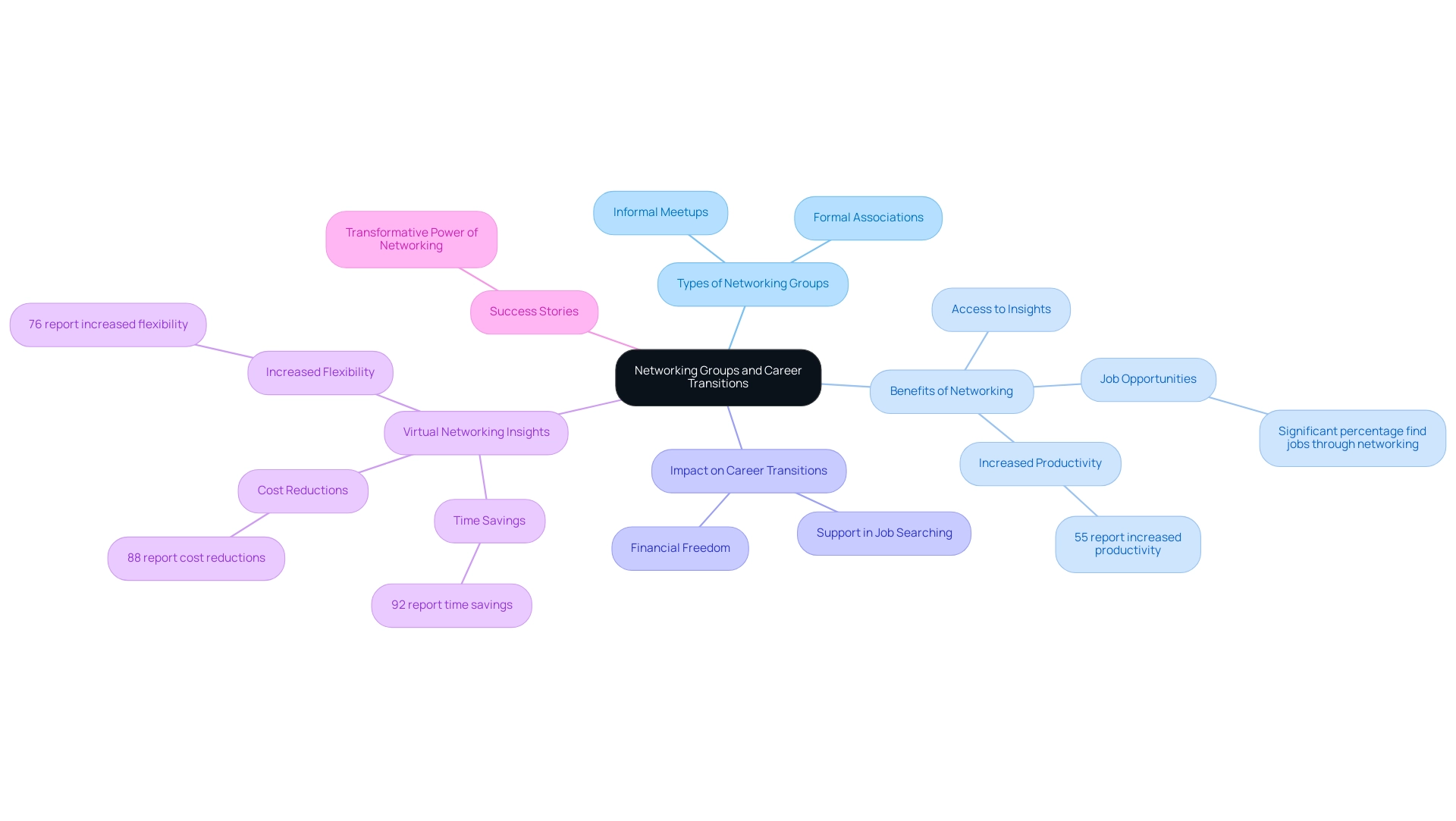
Exploring Different Types of Networking Groups
Networking groups come in various forms, each tailored to support individuals during job transitions, especially when it comes to enhancing income and achieving financial stability.
-
Industry Associations serve as vital resources, offering training and networking opportunities specific to various fields. These organizations often host events and workshops that can significantly boost members’ skills and connections. With a reported 15% increase in membership over the past year, their importance in job advancement cannot be overstated. For job seekers, these groups provide crucial insights and connections that can ease the transition, reinforcing Find Your Career 2.0’s commitment to helping individuals reinvent their professional lives and attain financial freedom.
-
Job Search Support Groups focus on guiding members through the job search journey, offering essential services like resume reviews, interview practice, and emotional support. They foster a collaborative environment where individuals can share experiences and strategies, creating a sense of community during challenging times. This support is vital for those facing the emotional and practical hurdles of professional transitions, helping to reduce risks and accelerate new job opportunities while underscoring the importance of financial stability.
-
Alumni Networks provide another avenue for connection, with many universities maintaining groups that facilitate interactions among graduates. These networks not only offer access to job leads but also mentorship opportunities, allowing individuals to benefit from the experiences of those who have successfully navigated similar paths. This can be particularly beneficial for understanding transferable skills and how they apply to new roles, addressing the limitations of traditional employment avenues.
-
Online Communities on platforms like LinkedIn and Facebook present a wealth of groups where members can exchange job postings, advice, and personal stories. The effectiveness of online networking is evident, with studies showing that casual discussions on LinkedIn can lead to new job opportunities and business partnerships, highlighting the platform’s relevance in today’s networking landscape. Engaging in these groups can help individuals discover new opportunities and rejuvenate their professional aspirations, ultimately enhancing their financial independence.
-
Local Meetups offer informal networking settings, often centered around shared interests or industries. In-person gatherings have shown a remarkable 40% close rate for converting prospects into new clients, showcasing the power of face-to-face interactions in building professional relationships. Such encounters can also foster a sense of personal agency, empowering individuals to take charge of their professional journeys and strive for financial stability.
To maximize the effectiveness of these connections, consider applying the 50/70 rule recommended by Sharon Sayler: maintain eye contact for 50% of the time while speaking and 70% while listening. This approach encourages involvement and strengthens bonds during conversations.
By exploring these diverse networking options, individuals can identify groups that resonate with their professional aspirations, ultimately enhancing their chances of a successful transition. Furthermore, for experts in fields like data science, attending industry conferences, participating in online communities, and engaging in open-source projects can further broaden their connections, paving the way for income growth and personal fulfillment.

Benefits of Joining Networking Groups for Career Transitioners
Joining networking groups offers a wealth of advantages for individuals navigating career transitions, especially in light of the insights shared in ‘Your Career Revolution’.
-
Access to Job Opportunities: Many job openings remain unadvertised, and professional groups often serve as a vital channel for sharing these hidden opportunities among members. Did you know that 70% of individuals employed at a company in 2016 had some form of connection there? This statistic highlights the importance of relationships in securing job opportunities. Additionally, the case study ‘Business Networking Statistics’ emphasizes that referrals contribute to longer employee tenure and that companies benefit significantly from collaboration activities in networking groups. This aligns with the urgency expressed in Chapter 6 of ‘Your Career Revolution’, where immediate action is crucial for professional advancement.
-
Support and Encouragement: Being part of networking groups fosters emotional backing from peers who understand the complexities of job transitions. This shared experience can alleviate feelings of isolation and anxiety, providing a sense of community during challenging times. The empowerment gained from such support is vital for navigating the uncertainties of a declining job market.
-
Skill Development: Numerous associations offer workshops and training sessions aimed at enhancing members’ abilities, ensuring they remain competitive in a changing job market. This commitment to professional development is essential for those looking to pivot their paths successfully, particularly when considering the transferable skills emphasized in ‘Your Career Revolution’. For instance, case studies in Chapter 7 illustrate how individuals have leveraged networking to acquire new skills that directly contributed to their professional advancements.
-
Mentorship Opportunities: Networking groups often facilitate connections with mentors who provide valuable guidance and insights from their professional journeys. This mentorship can be instrumental in helping individuals navigate their transitions more effectively, reinforcing the theme of personal agency in achieving financial independence and growth. The case studies in Chapter 7 further demonstrate how mentorship has played a pivotal role in successful career transitions.
-
Building Confidence: Regular interactions within networking groups allow individuals to practice their relationship-building skills, leading to increased confidence in professional settings. This boost in self-assurance is essential for making meaningful connections and pursuing new opportunities, echoing the message of taking control of one’s destiny as emphasized in the book.
While building connections can be a valuable part of a job search strategy, it is important to acknowledge that it is not a guaranteed method for securing a job. As Ed Herzog pointed out, “At this point, I’m going to say that the original author deliberately lied. His own chart doesn’t support the assertion that 85% of all jobs are discovered through connections.” However, by leveraging the advantages of networking, individuals can greatly enhance their job search efforts and overall development, positioning themselves for success in their new paths.
This aligns with The Entrepreneur’s Source’s focus on a comprehensive and personalized approach to coaching, empowering individuals to take control of their professional futures. Furthermore, understanding the financial implications of professional transitions, as discussed in ‘Your Career Revolution’, can guide individuals in making informed decisions about their paths.
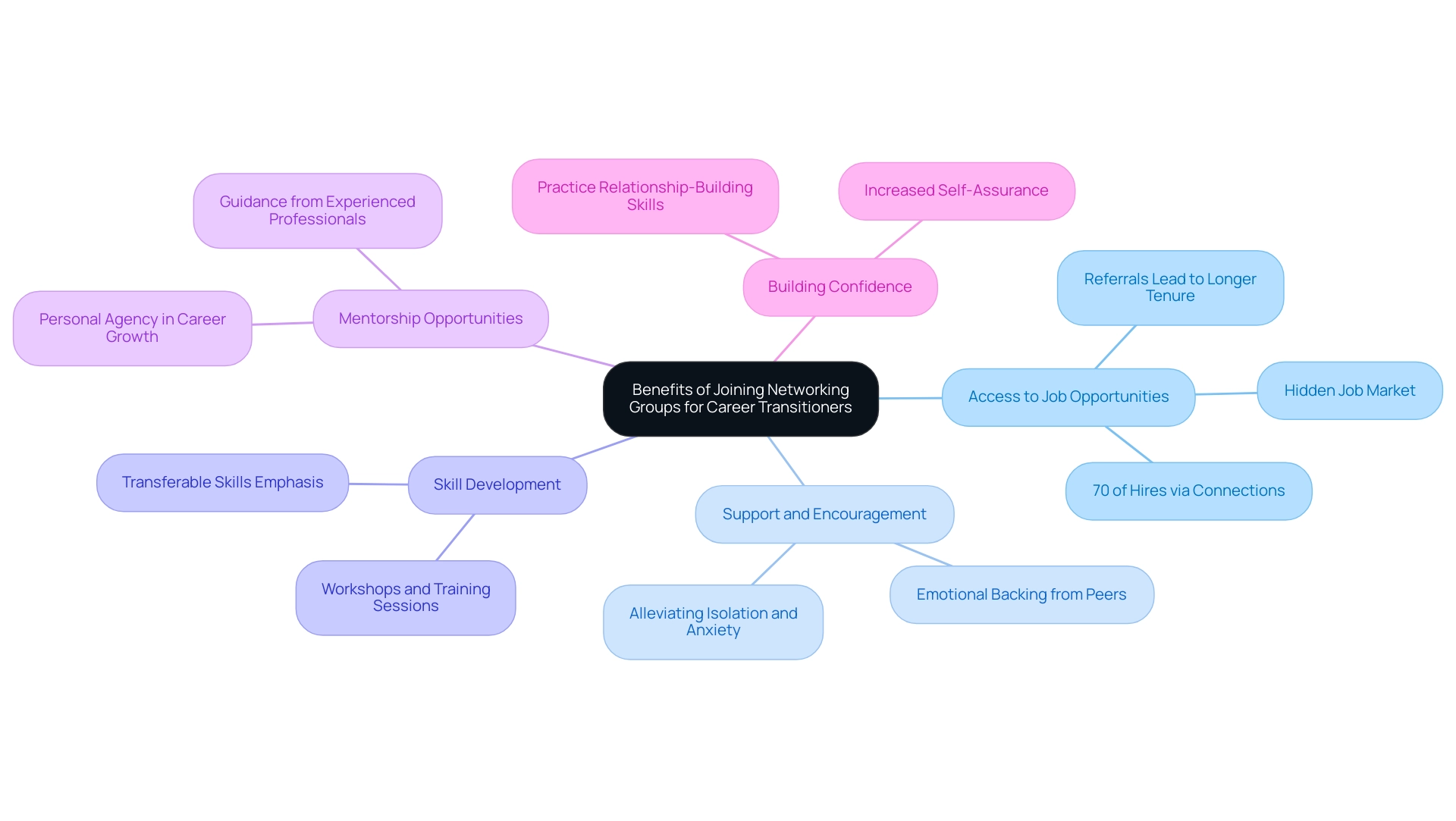
Strategies for Engaging with Networking Groups Effectively
To engage effectively with networking groups, consider these compassionate strategies:
-
Be Prepared: We understand that attending meetings can feel daunting. Prior to your next gathering, take a moment to research the group and its members. Formulating questions and topics to discuss can facilitate meaningful conversations, demonstrating your genuine interest in navigating your professional challenges, especially given the limitations of conventional employment options.
-
Set Clear Goals: You are not alone in feeling uncertain about your career path. Clearly defining what you hope to achieve through your relationship-building efforts can empower you. Whether it’s finding a mentor, uncovering job openings, or gaining insights into your industry, having specific objectives will guide your interactions and help you take control of your professional journey—especially in a declining job market where employability can be a challenge.
-
Follow Up: After meeting someone, consider sending a follow-up message to express your appreciation for the conversation. This simple gesture not only reinforces your connection but also keeps the dialogue open for future opportunities, which is crucial in a declining job market.
-
Participate Actively: Regular attendance at meetings and contributing to discussions can significantly enhance your visibility and engagement within the group. We encourage you to volunteer for group activities as well. Active participation showcases your commitment and can lead to deeper relationships, essential for building a supportive network as you transition to business ownership. Highlighting your transferable skills during these interactions can also demonstrate your adaptability and readiness for new opportunities.
-
Leverage Online Platforms: Utilize social media to connect with group members, share relevant content, and engage in online discussions. Given that 50.6% of worldwide LinkedIn users are between ages 25 and 34 years old, targeting this demographic can be particularly effective. Sharing captivating material, such as short-form videos, can improve your connection efforts, especially with younger audiences. As Parnell Woodard, a Job Ownership Coach, emphasizes, “Transitioning from traditional employment to ownership of one’s work requires building strong connections and leveraging available resources.”
By employing these strategies, you can optimize your connections and cultivate meaningful relationships that ultimately improve your transition journey toward financial independence and personal development. Remember, the possibility for wealth accumulation through productive connections is within your reach. Let this inspire you to take proactive measures in your professional path. 🌟
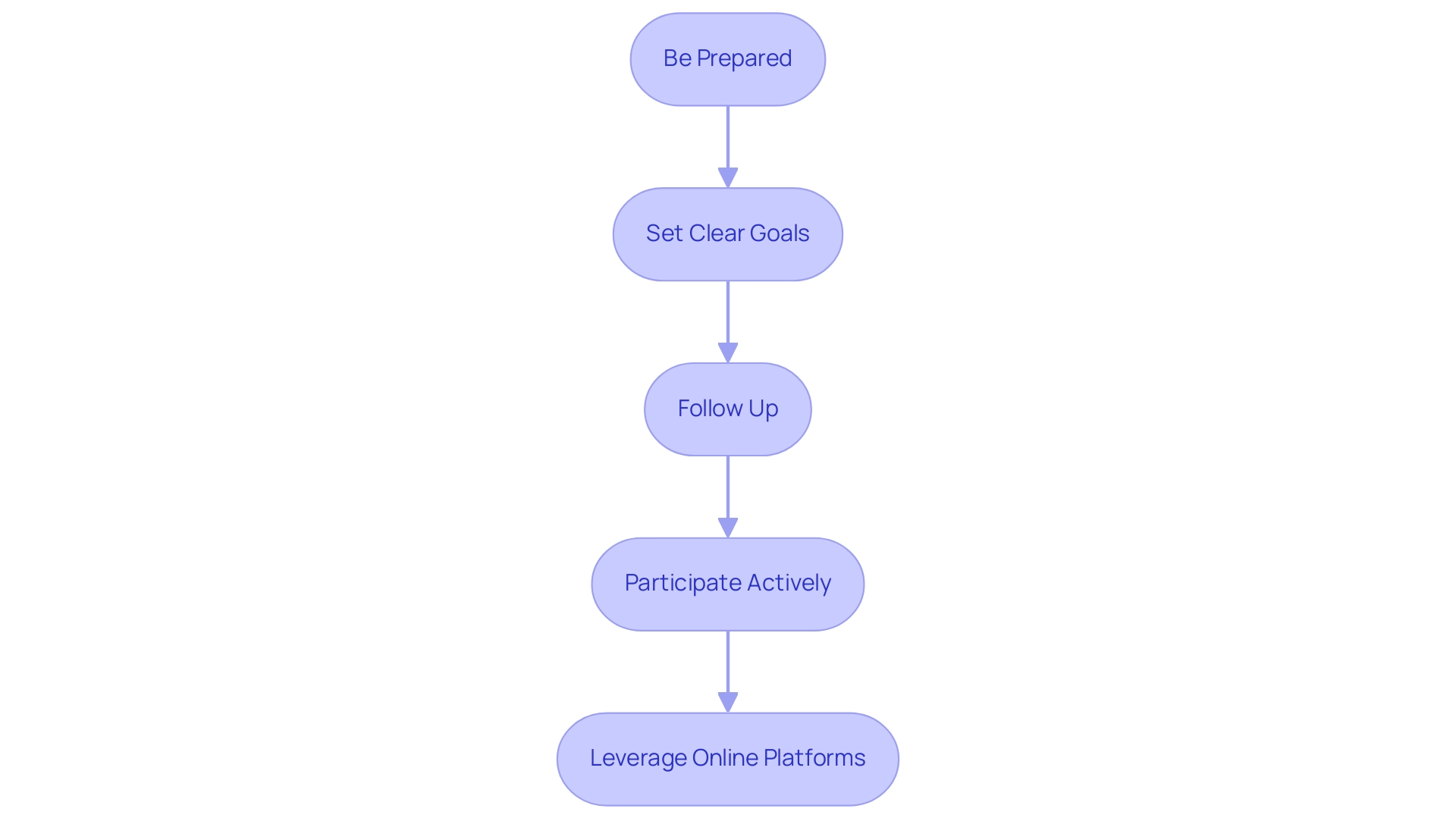
Leveraging Networking Connections to Discover Job Opportunities
To effectively leverage your networking connections for job opportunities, consider the following steps:
-
Inform Your Network: It’s important to communicate clearly with your connections about your active job search. Let them know the types of roles you are interested in, as this can help them assist you better.
-
Request Informational Interviews: Reach out to individuals within your network for informational interviews. This not only provides valuable insights into their companies but also uncovers potential openings that may not be publicly advertised.
-
Ask for Referrals: Don’t hesitate to request referrals from your connections. A personal introduction to hiring managers can significantly enhance your chances of landing an interview.
-
Stay Engaged: Maintain regular contact with your network by sharing updates about your job search and expressing gratitude for any assistance they provide. This keeps you top-of-mind and reinforces your professional relationships, which is crucial for building a supportive community during your career transition.
-
Utilize Social Media: Leverage platforms like LinkedIn to showcase your skills and experiences. A well-crafted profile makes it easier for your connections to refer you to relevant opportunities, enhancing your visibility in the job market. This is particularly important as jobs today are often short-lived, and having a strong online presence can help you stand out.
-
Acknowledge Current Challenges: Be aware that COVID-19 has affected face-to-face interactions, making it more challenging to maintain connections. Consider virtual networking events and online platforms as effective ways to stay engaged with your network. Adapting to these changes is vital for your personal growth and empowerment in a shifting job landscape.
-
Participate in Networking Events: Take advantage of upcoming events like the ‘Leap Into Your Future’ scheduled for February 26th, 2025, from 9 am – 1 pm. Such events offer outstanding chances to connect with new individuals and broaden your network, assisting you in uncovering new possibilities beyond your existing experiences.
By actively interacting with your networking groups and employing these strategies, you can uncover job opportunities that align with your professional goals, facilitating a smoother and more successful transition. Additionally, the case study titled ‘The Strategic Necessity of Employee Referrals‘ emphasizes that employee referrals have evolved into a strategic necessity for businesses, benefiting both job seekers and companies alike. Remember, taking control of your professional destiny is essential for achieving financial freedom and navigating the challenges of today’s job market.
This guidance is brought to you by Find Your Career 2.0 | Career Ownership Coach Parnell Woodard.
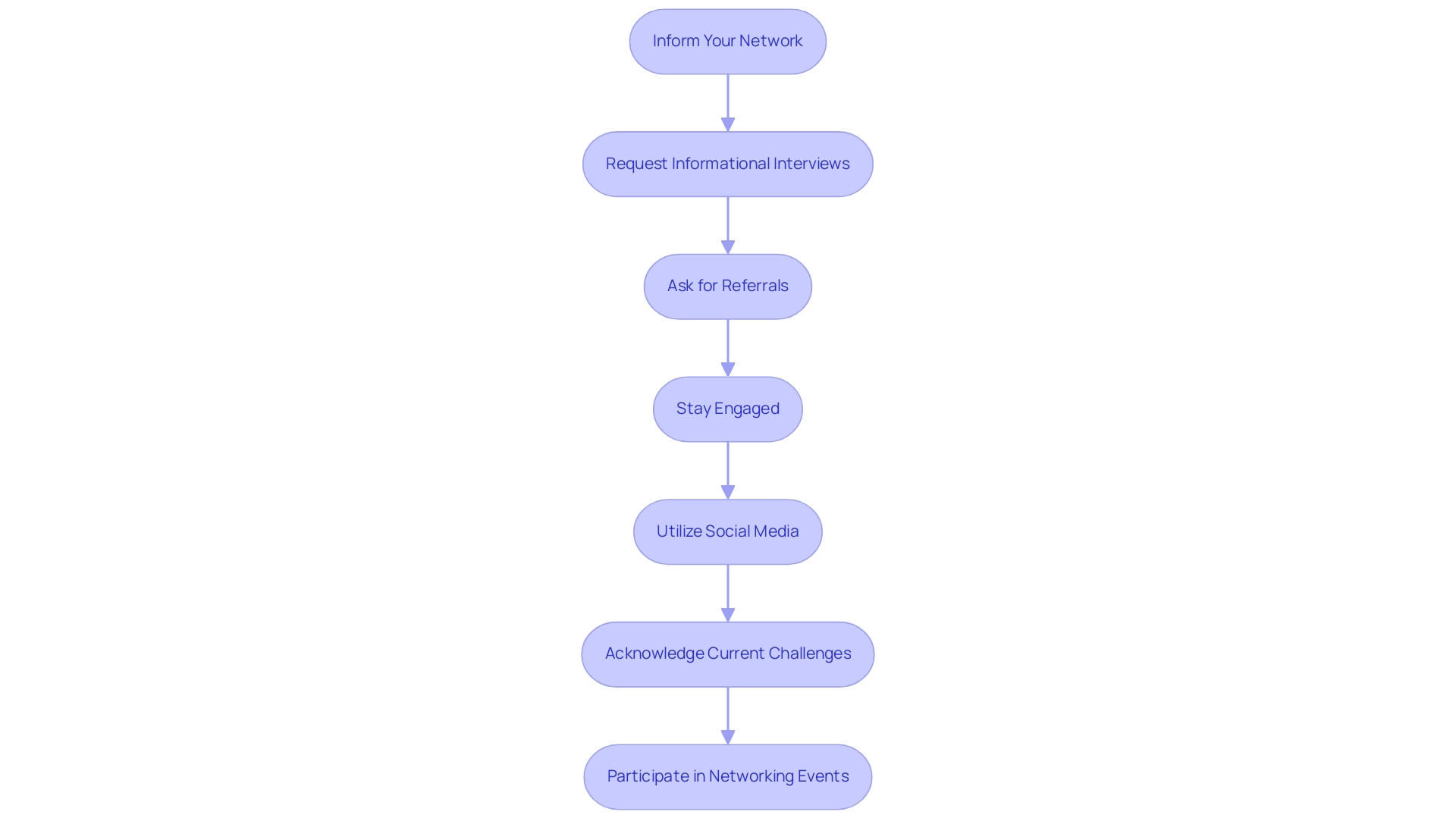
Overcoming Challenges in Networking During Career Transitions
Networking during a career transition can be daunting, filled with challenges that may feel overwhelming. However, by understanding these obstacles and developing strategies to overcome them, you can significantly enhance your experience. Let’s explore some common hurdles and effective ways to address them:
-
Fear of Rejection: It’s natural to feel apprehensive about being ignored or rejected. But remember, most professionals are genuinely open to helping others. Approach your connections with curiosity and a willingness to learn, rather than desperation. This shift in perspective can help ease the anxiety that often accompanies reaching out.
-
Limited Connections: If your network feels sparse, don’t worry. Start by reconnecting with former colleagues, classmates, or industry contacts. Participating in local connection events can also help broaden your circle. Engaging with networking groups that align with your career interests can lead to valuable connections and opportunities, especially as you navigate the complexities of the Battered Career Syndrome and Investor Syndrome, which often require a strong support network.
-
Lack of Confidence: Building confidence in social situations is a gradual process. Practice your elevator pitch and engage in conversations to become more comfortable. Consider joining networking groups or workshops focused on career growth, where you can practice connecting in a supportive environment. This empowerment is crucial for achieving financial independence and personal growth in today’s changing job market.
-
Time Constraints: Many professionals cite time as a significant barrier to making connections, with 49% indicating they struggle to find the time to connect. To combat this, prioritize your networking efforts by scheduling specific times for these activities in your calendar. Treat these appointments as essential commitments to ensure they remain a focus during your job search.
-
Navigating Online Platforms: With the rise of digital connections, becoming proficient in platforms like LinkedIn is essential. Take the time to learn how to effectively use these tools. Engage in discussions, share insights, and connect with industry experts to build your online presence. Research shows that 61% of LinkedIn users believe regular online interaction can lead to job opportunities, highlighting the importance of engaging in these spaces. As Ryan Bradshaw notes, the top benefits of online connections include saving time (92%), saving money (88%), and offering more flexibility in location and timing (76%).
By proactively addressing these challenges, you can enhance your networking experiences. Success stories abound, particularly among younger professionals who are increasingly job-hopping—averaging 4.5 jobs by age 34—demonstrating a willingness to explore diverse roles and industries. This trend indicates that around 20% of people switch professions for upward mobility, underscoring the significance of connections in attaining professional advancement.
Embracing connections as a vital element of your professional transition can lead to meaningful relationships and opportunities, ultimately paving the way for a fulfilling professional journey. Furthermore, consider looking for free networking groups and connection events nearby this week to expand your business contacts and take the initiative toward entrepreneurship.
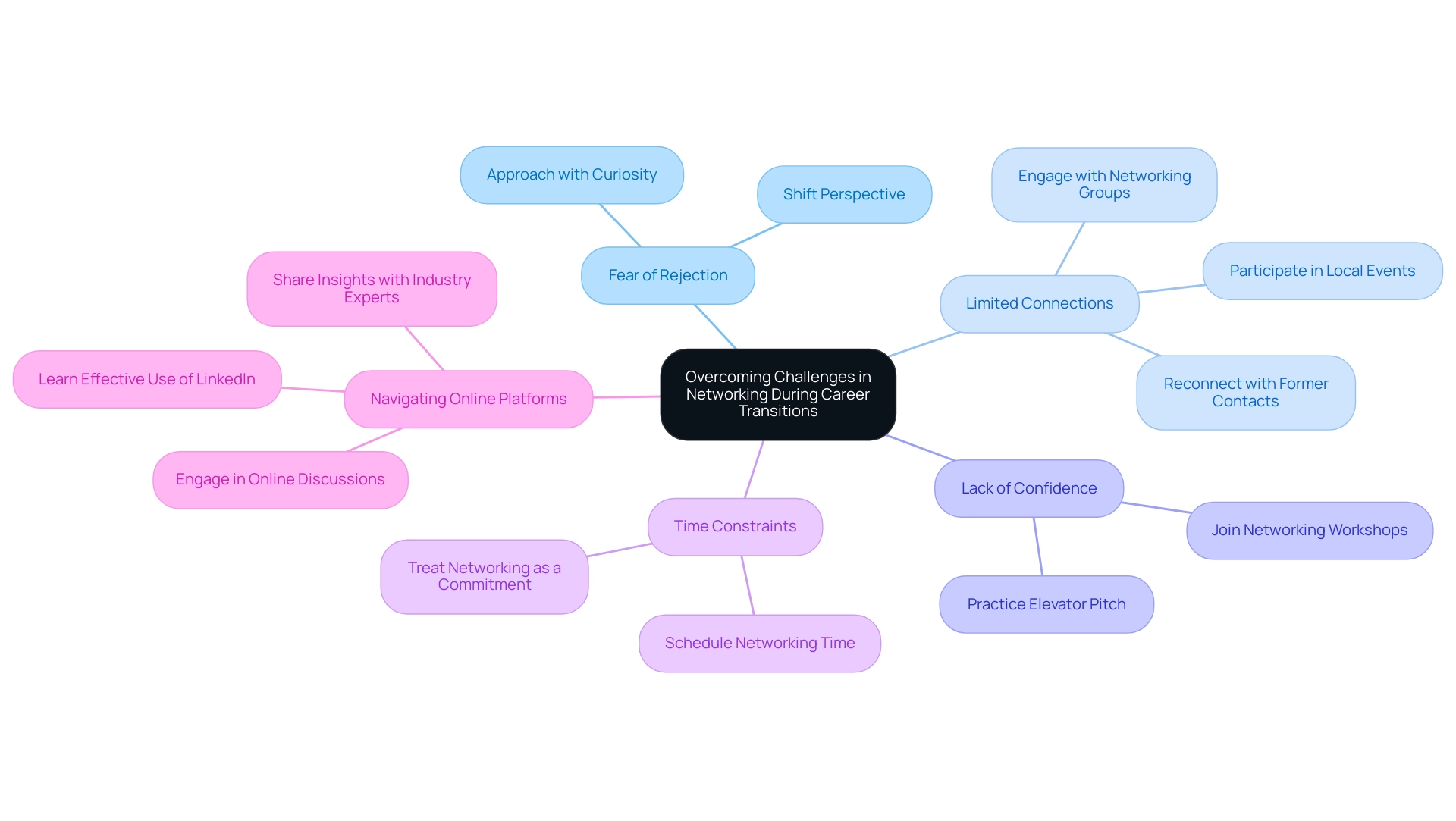
The Importance of Ongoing Networking for Career Success
Continuous connections through networking groups are essential for achieving long-term professional success, especially in today’s ever-evolving job market. We understand that navigating these changes can feel overwhelming, but here’s why building and maintaining your network is vital:
-
Adaptability: As industries evolve, a robust network keeps you informed about changes and emerging opportunities. You are not alone in facing these shifts; professionals with strong networks are better equipped to enhance their adaptability. The impact of COVID-19 has underscored the necessity for adaptability in networking practices, as many individuals have pivoted to online methods. This adaptability is crucial for your career longevity and financial independence, allowing you to seize new opportunities as they arise.
-
Continuous Learning: Networking opens doors to new ideas, trends, and best practices that can significantly enhance your skills and knowledge. Engaging with a variety of experts enables you to stay informed about industry developments and innovations, which is crucial for sustaining employability in a declining job market. This continuous learning fosters the development of transferable skills applicable across various roles and industries.
-
Support System: A strong network serves as an essential support system during professional challenges. It provides encouragement, advice, and resources when navigating difficult transitions, helping you maintain resilience in the face of adversity. Many individuals feel ashamed to connect after layoffs, which can obstruct their relationship-building efforts. However, leveraging community connections within networking groups can empower you to reclaim your professional path and pursue financial freedom.
-
Career Advancement: Many job opportunities arise from connections made over time. Regularly engaging with your network not only increases your visibility but also enhances your chances of being considered for new roles. Statistics indicate that 4 out of 5 professionals credit networking as a key factor in discovering new opportunities, underscoring its significance for professional advancement. This is especially pertinent for those seeking to fast-track their new professions and create the lifestyle of their dreams.
-
Taking Control of Your Destiny: In a declining job market, it is essential to actively take control of your professional path. Networking not only helps you discover opportunities but also allows you to mitigate risks associated with job instability. By building a diverse network, you can position yourself strategically to navigate challenges and seize new possibilities.
-
Building Reputation: Regular connections assist in establishing your reputation as an informed and trustworthy expert in your field. This ongoing engagement fosters trust and recognition, making you a go-to resource within your industry. By actively participating in professional events and networking groups, you showcase your dedication to personal agency and community involvement, which are essential in today’s job market.
By dedicating yourself to continuous connections, you place yourself advantageously for future professional advancements and opportunities. As the landscape of career connections continues to change, especially following the COVID-19 pandemic, adjusting to new approaches—such as online interactions—has become crucial. Recent surveys show that 61% of individuals think online connections have enhanced their job prospects, emphasizing the significance of adopting both conventional and digital relationship-building methods.
Success stories abound, showcasing how professionals have leveraged their networks to pivot successfully during challenging times. This reinforces the notion that networking is not just beneficial but essential for your career adaptability and growth.
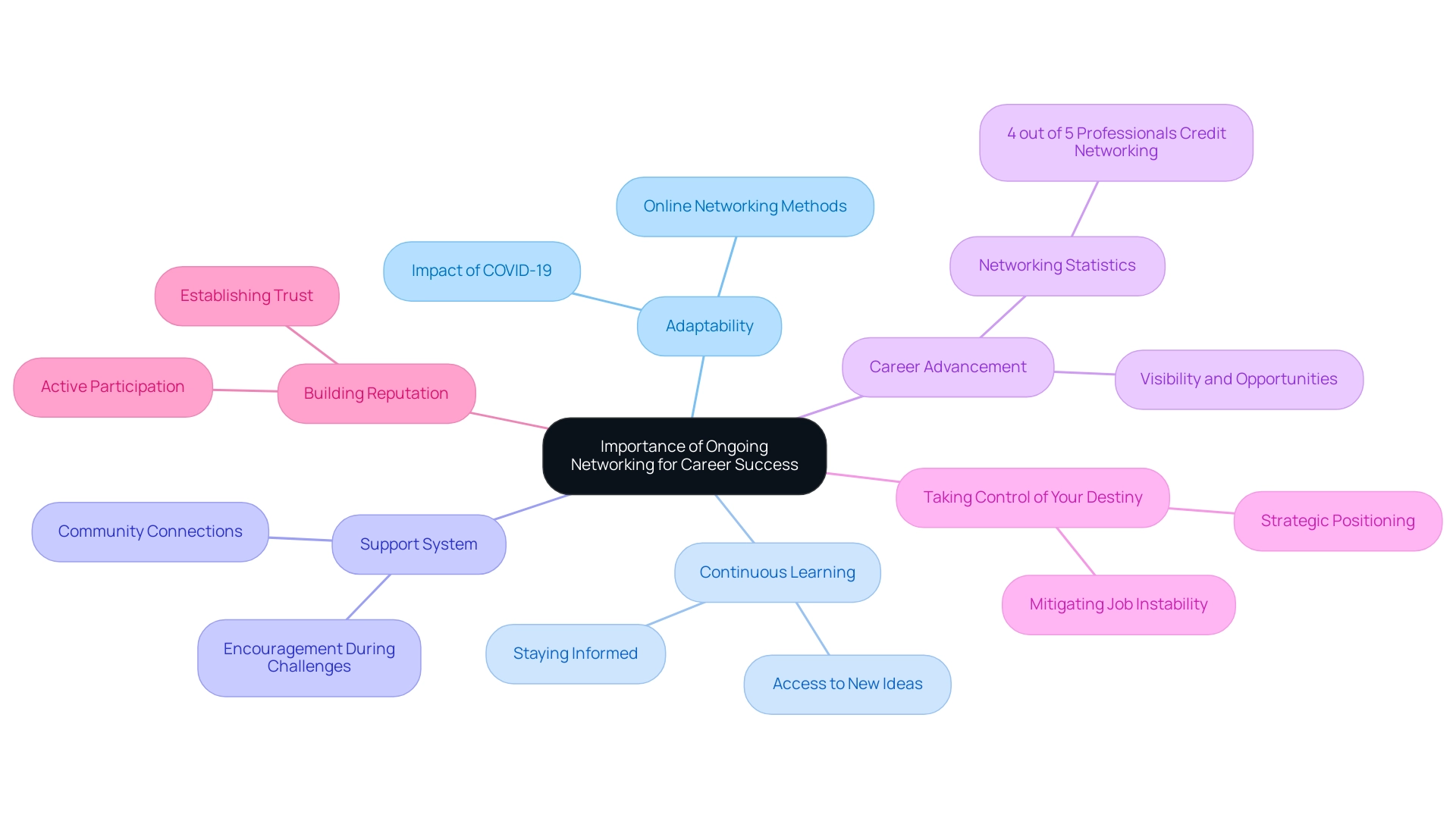
Conclusion
Networking groups are truly vital in navigating career transitions, offering the support, resources, and invaluable connections that can significantly enhance your chances of success. By engaging in these communities, you gain access to hidden job opportunities, industry insights, and the emotional encouragement that can ease the stress often associated with job searching. The variety of networking groups—from professional associations to informal meetups—ensures that you can find the right fit for your career aspirations.
Effective engagement with these groups is essential. By preparing adequately, setting clear goals, and actively participating, you can maximize your networking potential and build meaningful relationships. It’s important to overcome common challenges such as fear of rejection and time constraints to truly make the most of these networking opportunities. Remember, ongoing networking is crucial for career success; it fosters adaptability, continuous learning, and a robust support system that empowers you to take control of your professional destiny.
In today’s competitive job market, we cannot underestimate the importance of networking. It serves not only as a strategy for finding job opportunities but also as a pathway to personal and professional growth. By embracing the power of networking, you can unlock new possibilities, achieve your career goals, and work toward financial independence. Taking proactive steps in building and nurturing these connections is a vital investment in your future, ensuring that your journey through career transitions is not just manageable but also filled with opportunities for reinvention and success.
Frequently Asked Questions
What are networking groups and why are they important?
Networking groups are essential communities where individuals share resources, advice, and support during job transitions. They connect people facing similar challenges in a declining job market, helping to improve employability and personal agency.
What types of networking groups exist?
Networking groups can take various forms, including industry associations, job search support groups, alumni networks, online communities, and local meetups, each tailored to support individuals during job transitions.
How do industry associations benefit job seekers?
Industry associations offer training and networking opportunities specific to various fields, hosting events and workshops that boost members’ skills and connections, ultimately aiding in job advancement.
What services do job search support groups provide?
Job search support groups guide members through the job search process, offering services like resume reviews, interview practice, and emotional support, fostering a collaborative environment.
How can alumni networks assist job seekers?
Alumni networks facilitate interactions among graduates, providing access to job leads and mentorship opportunities, which can help individuals understand transferable skills relevant to new roles.
What role do online communities play in networking?
Online communities on platforms like LinkedIn and Facebook allow members to exchange job postings, advice, and personal stories, leading to new job opportunities and business partnerships.
What are the advantages of local meetups for networking?
Local meetups provide informal networking settings that can lead to a high conversion rate for new clients, showcasing the effectiveness of face-to-face interactions in building professional relationships.
What impact did the Covid-19 pandemic have on networking?
The shift to virtual connections during the pandemic demonstrated benefits such as time savings, cost reductions, and increased flexibility, though in-person interactions still hold significant value.
How can networking lead to income growth?
Networking not only helps in finding job opportunities but can also lead to income growth, which is crucial for achieving financial freedom.
What is the 50/70 rule in networking?
The 50/70 rule suggests maintaining eye contact for 50% of the time while speaking and 70% while listening to encourage involvement and strengthen bonds during conversations.


